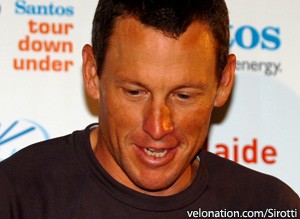“It was a clear conflict of interest for USADA. We had no hesitation in rejecting that offer.”
 Already confirmed as donating large sums of money in the past to the UCI, something which has led to criticism and allegations of bribery, Lance Armstrong has allegedly also offered the same to the agency which ultimately went on to hand him a lifetime ban for doping.
Already confirmed as donating large sums of money in the past to the UCI, something which has led to criticism and allegations of bribery, Lance Armstrong has allegedly also offered the same to the agency which ultimately went on to hand him a lifetime ban for doping.
USADA CEO Travis Tygart has confirmed to the 60 Minutes programme that the former pro offered a considerable amount of money in 2004, the year he won his sixth Tour de France. According to Tygart, the amount was ‘in excess of $150,000.’
In the programme, which screens tomorrow night at 10pm on the CBS network, the 60 Minutes Sports senior reporter Scott Pelley told Tygart that he understood the sum was $250,000. “It was around that ballpark,” confirms Tygart.
“I was stunned,” Tygart tells Pelley, according to CBS. “It was clear…it was a clear conflict of interest for USADA. We had no hesitation in rejecting that offer.”
Armstrong’s lawyer Tim Herman rejected the suggestion today. “[There’s] no truth to that story,” he told USA Today. “First Lance heard of it was today. He never made any such contribution or suggestion.”
Tygart has previously described Armstrong’s payment of $100,000 to the UCI as ‘totally inappropriate.’ His feelings are echoed by respected anti-doping researcher Michael Ashenden, who told the BBC last October that the 2002 payment, which came one year after the UCI learned Armstrong had returned a suspicious EPO test, was completely wrong.
“The UCI should never have accepted money from Armstrong under any circumstances,” he said then. “But if they took money after they were aware there were grounds to suspect Armstrong had used EPO, it takes on a really sinister complexion.”
In 2004 Armstrong launched a legal battle to recoup withheld performance bonuses from the SCA Promotions company. It was due to hand over $5 million when he won his sixth Tour, but refused to do so on the grounds that it suspected he had doped.
USADA was amongst those that Armstrong’s lawyers called on in arguing his case, with the agency confirming then that there was no evidence proving he was doping.
Years later, it was successful in building a case against the rider, with witness testimony from his former team-mates proving vital in confirming what anti-doping tests could not.